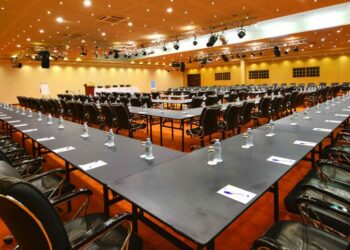By Denis Jjuuko
Many years ago and on weekends, people donning their Sunday clothes would descend on Makerere University with gifts. Somebody had decided to get married and their reception was in either the main hall or in some of the sober halls of residence like University Hall. I am thinking Makerere or these halls used to earn money every weekend from such events.
Today, the only wedding you can organize at Makerere is the Church service. Even that one is a big risk. You can’t tell whether the university would be open and most importantly whether the students won’t forcefully grab your guests’ dinner and alcohol. It is a risk wedding organisers gladly avoid. And that has denied the university income.
It was, therefore, liberating to hear that Makerere is going to open up its vast land to investors in real estate. If it gets people willing to build hostels, hotels, and conference facilities, then Makerere will make money. However, Makerere needs to go full cycle and urge government to scrap the government sponsorship scheme and do a bit more.
The government pays tuition for about 4,000 students every year. I think it even gives them living allowances. It is a good political gimmick, which is ineffective. To qualify for government sponsorship, the students must excel in final senior six exams. Only the best students academically are considered.
I am not actually sure that the best students are the ones who are enrolled on government sponsorship because they come from a few elite schools. The learning environment at the elite schools and other schools is miles apart. And the best schools whether in Kalangala or Wakiso District are ones that charge more than what universities charge per a term. A student who comes from Kings College Buddo, Gayaaza or St Mary’s Kitende doesn’t need government sponsorship. A student that comes from the best school in Arua or Kamuli doesn’t either. This is because these students are from rich families, which are able to pay millions three times a year for their kids’ education in those elite schools.
The government should still give Makerere and all these public universities money as it does today but it should ensure all students pay. This means that universities would not need to raise tuition fees because of this subsidy. This would enable them have enough money to pay lecturers better and carryout groundbreaking research, which again they can commercialise. Makerere’s shareholding in companies like Kiira Motors is the right step.
The politicians who think they will lose votes if they scrap government sponsorship need not worry much. The majority of Ugandan students will never be admitted to Makerere on government sponsorship. The rich are few, so the votes that may be lost aren’t that many.
It is also important to note that a country doesn’t need a lot of university graduates to develop. A country needs the majority of its people employed earning a regular predictable income. For example, Roofings or Coca Cola don’t need a lot of graduates to operate efficiently. In fact, the majority of employees at such companies have basic education and learn a lot on the job on how to operate machinery and ensure the factories are running.
And usually in any factory, the job that is done is repetitive so there isn’t much thinking required. Even in a hospital, you need more nurses than specialist doctors. At a construction site, you only need a few engineers and architects, the majority of workers have basic education in masonry. So why is Uganda paying so much for degrees which in end aren’t needed to develop our country? University education though should be supported; it shouldn’t be looked at as a public good.
Universities must also look at themselves as for-profit businesses and start looking for money beyond tuition fees and government sponsorship. Halls of residences can provide rooms for people attending conferences during holidays. Journalism schools can run commercial TV and radio stations as well as multimedia enterprises.
ICT schools can create cloud computing products and apps and sell them to both the public and private sector. Makerere used to have a printery, which I think can make it earn a lot of money. I don’t know how modern and efficient it is today.
Private sector brands can sponsor courses, which are aligned to their interests. This means that universities must have marketing departments. For example, Bank of Uganda or NSSF could sponsor a business journalism course where money could pay lecturers’ allowances, research and the necessary education tools.
Hima Cement could sponsor civil engineering and architecture while the breweries could pay for agriculture after all they are now making beer from cassava. The telcos could easily sponsor ICT courses and insurance companies could pay for medicine or education.
The savings off such sponsorships and donations can create endowment funds, which can be invested. That way, the universities will train students with the skills necessary for the market. Tuition fees alone cannot help run a university of the 21st century.
The writer is a media consultant and businessman. Twitter: @Denis_Jjuuko
Do you have a story in your community or an opinion to share with us: Email us at editorial@watchdoguganda.com









